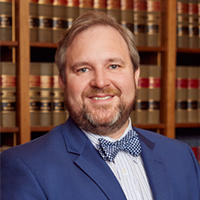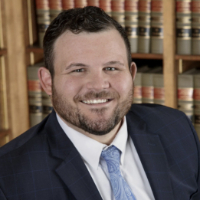 Springfield Felony Lawyers, Arkansas
Springfield Felony Lawyers, Arkansas
Not enough matches for Springfield Felony lawyer.
Below are all Springfield Criminal lawyers.
Sponsored Lawyers
1-10 of 38 matches
Criminal, Divorce & Family Law
Former prosecutor, David Parker, joined Dodds, Kidd, Ryan & Rowan in 2017. After graduating from UALR William H. Bowen School of Law in 2008, David worked as a Deputy Prosecuting Attorney, where he prosecuted over 30,000 criminal cases in White County District and Circuit Courts. There, he also served as Special Judge in White County District Court – Civil Division. Following his time as a prosecutor, David worked at the Department of Finance and Administration as Revenue Legal Counsel. There, David represented the department in all DWI drivers’ license appeal cases for the entire state of Arkansas. As part of his representation for the department, David played a key role in lobbying legislators and drafting legislation regarding Arkansas’ DWI laws, licensing and criminal statutes. Besides his work on DWI appeals, David litigated tax protests, business closures, and other civil lawsuits on behalf of DFA. As a Little Rock native, David serves on the Board of Directors for the Big Dam Bridge Foundation, whose mission is to promote the use, support, and preservation of the Big Dam Bridge for the advancement of health, fitness, cultural and recreational activities in Arkansas. David is also among the sixteen founding members of the Little Rock Touchdown Club, where membership has grown to more than 800 members, with the purpose of bringing football fans together to support all levels of Arkansas football.
(more)Accident & Injury, Criminal, Divorce & Family Law, Social Security
I was exposed to law at an early age as my grandfather and father were trial lawyers, grandmother was a court reporter and my uncle was a US Marshall. I had the opportunity to view trials starting at a very young age and see how a trial lawyer was able to help a client through very difficult times. In high school, I excelled at debate and was encouraged to pursue the practice of law. I enjoy trying cases and helping clients and families achieve justice through the legal system.
(more)Accident & Injury, Divorce & Family Law, Criminal
Little Rock native Catherine Ryan joined Dodds, Kidd & Ryan in 2016 after fourteen years representing injured parties as a trial lawyer in Boston, Massachusetts. Catherine practices in all areas of civil litigation, with an emphasis in tort and product liability and professional negligence claims. She has successfully brought appeals of both civil and criminal matters to the Arkansas Supreme Court and Court of Appeals. Catherine was elected to become a Member of the Fellows of the American Bar Foundation, an organization of legal professionals that is limited to the top one percent of lawyers licensed to practice in each jurisdiction. She has successfully represented clients in state and Federal court on a wide-variety of cases ranging from simple auto accidents to contract disputes, multi-district litigation and qui-tam claims.
(more)Criminal, Divorce & Family Law, Employment
Mr. Newcomb proudly represents clients in need of Criminal and Employment matters.
(more)Accident & Injury, Divorce & Family Law, Criminal









